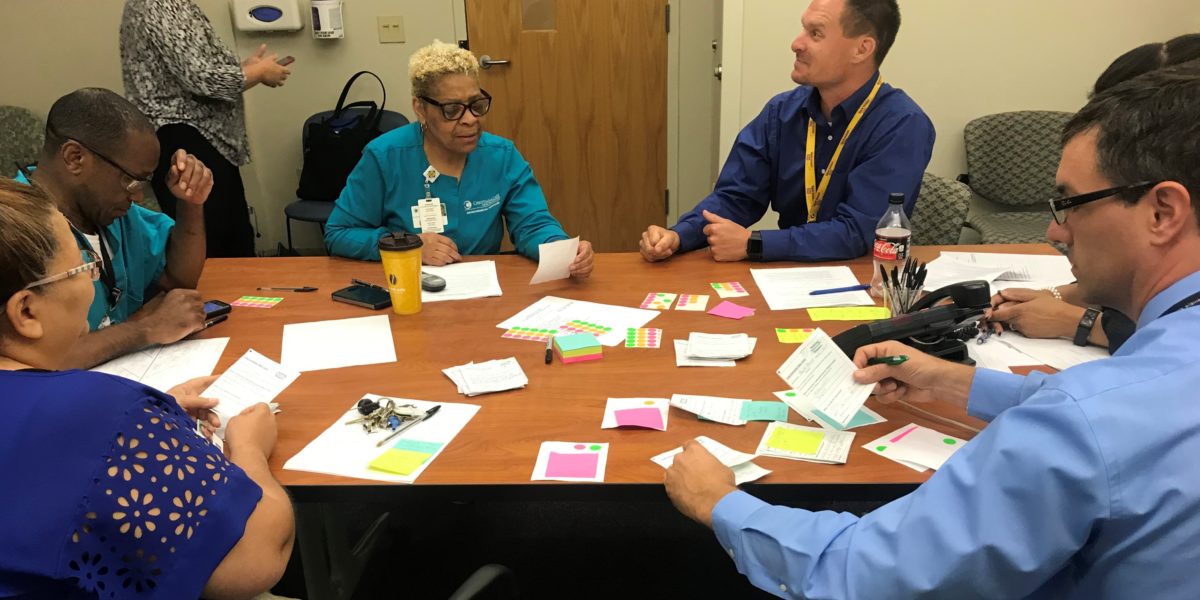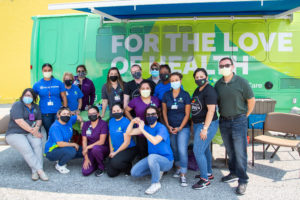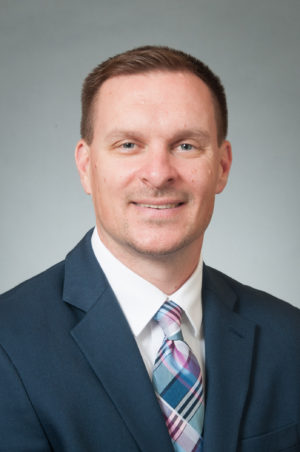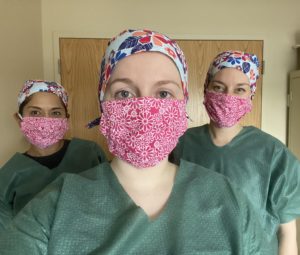ChristianaCare has long been committed to being exceptional today and even better tomorrow. Now a transformative framework called Making Tomorrow Happen is energizing caregivers to deliver on that promise just a little bit quicker.
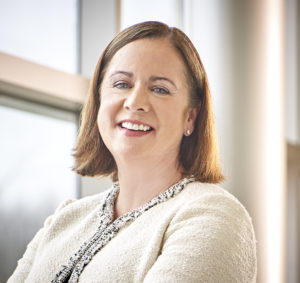
Historically, leaders were asked to solve all problems. Making Tomorrow Happen recognizes that it is often the caregivers on the frontlines of patient care, and those providing essential support, such as in Environmental Services, who are in the best position to identify what works well and what needs to change. Their recommendations are opportunities to improve safety practices and patient experiences, and to find creative ways to use resources wisely.
By identifying what works well and what could be improved on, caregivers are leading the way for ChristianaCare to achieve — and accelerate — the promise of an even better tomorrow.
“We know that where love leads, excellence is inevitable,” said Janice Nevin, M.D., MPH, ChristianaCare president and CEO. “When we create an environment of continuous improvement where our caregivers feel empowered to lean toward problems, the outcome is a better experience for all involved.”
A framework for tomorrow
In the Making Tomorrow Happen model, leaders are champions of change giving frontline caregivers the opportunity — and tools — to lead the charge, said Jason Funyak, director of Environmental Services, whose team was a model area for the framework.
“When caregivers solve their own problems, it has a much greater chance of sustainment,” Funyak said.
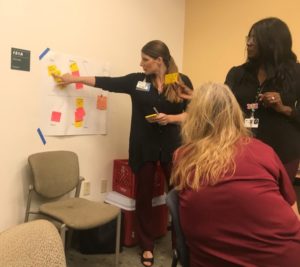
Making Tomorrow Happen incorporates a set of leadership practices and proven problem-solving methods which create an environment where all 13,000 caregivers feel comfortable and confident identifying barriers and sharing ideas for improvement. These include:
- Team Huddles — Caregivers gather daily or by shift to identify and highlight progress towards their goals and identify opportunities for improvement.
- Huddle Boards — Information shared in huddles is prominently displayed in the unit or work area.
- Go-Sees — Leaders are physically present in their departments to support caregivers in creating an environment of continuous improvement and helping caregivers address issues in real-time before they escalate to larger problems.
- Humble Inquiry — Leaders, and team members, learn to ask questions and seek input in ways that build trusting relationships.
- Psychological Safety — Creating an environment where team members feel accepted, respected and secure in suggesting new ways to improve a process is key to continuous improvement. Issues that cannot be solved within the team are escalated to leaders, who approach issues with tested problem-solving methods.
Call to action
Making Tomorrow Happen builds on ChristianaCare’s widely embraced Values & Behaviors, encouraging caregivers to seek new knowledge and be open to change; tell the truth with courage and empathy and accept responsibility for creating solutions.
Environmental Services is a hospital’s foremost line of defense against infection. The team was selected to test-drive the Making Tomorrow Happen framework, and help co-create the model for the system. The team huddled during every shift on the Wilmington campus and had opportunities to meet with other caregivers on the unit to discuss opportunities in their work areas and come up with ways to break down barriers to excellence.
Together, among the many successes that stemmed from their huddles, Wilmington Environmental Services came up with ways to:
- Get rooms cleaner more quickly between patients to shorten wait time for a patient in the Emergency Department to get a hospital room.
- Increase compliance with critical cleaning processes and decreased risk of infection by implementing an innovative UV-C wand and spray regimen.
- Create a biohazard waste stewardship program that saved the system nearly $130,000 in potential fines for unlabeled bags.
- Improve the sharps disposal process to greatly reduce safety risks for caregivers.
- Reduce back injuries among team members lifting heavy linen bags.
In total, the Wilmington Environmental Services team implemented improvements that eliminated nearly $400,000 a year in potential fines and wasted time for caregivers. The time saving is especially important as it allows team members to focus on value-added activities that improve care and service to patients.
Managers were challenged to lead differently using psychological safety and humble inquiry to empower caregivers to speak up and contribute ways to improve. These new management approaches create a powerful dynamic of caregiver engagement that unleashes caregivers’ potential to see — and solve — problems using their own creativity and ideas.
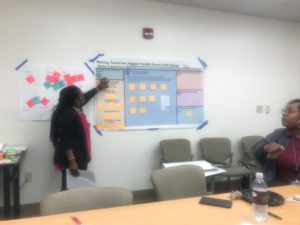
“With Making Tomorrow Happen we now look at barriers as a way to improve the process,” said Funyak. “Instead of saying ‘We’ve done it this way forever,’ we now think beyond what we do every day to find the opportunity.”
Engagement measurement data from the initial model areas show that caregivers report the program is making care safer and improving experiences for caregivers, patients and their families; improving efficiency; reducing caregiver injuries; and leading to more efficient use of resources. Making Tomorrow Happen improves respect and accountability, and team members express feeling more empowered, more involved and more in control, and now feel they have a hand in creating a safer environment.
The Wilmington Environmental Services team implemented improvements with the potential to save nearly $400,000 a year in costs.
“Huddle Boards are a great tool to get everybody on the same page,” said Tyrone Badson, service assistant with Environmental Services. “When we are given the tools and opportunities — when our voice is being heard — it helps us to be better at our jobs,” he said. “Hats off to ChristianaCare for giving us this opportunity to be able to shine.”
Ariel Rodriguez, also a service assistant with Environmental Services, agrees that Making Tomorrow Happen gives frontline caregivers a voice.
“We are more respected for the amount of work we do and it has made a huge difference,” he said. “Now I come to work and think, ‘What can I do to help my teammates and contribute to build a better environment?’” she said. “If we continue like this, we will tackle all of the issues and everything is going to run smoother and be better for everybody.”
A lasting impact
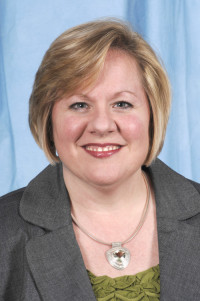
Michelle Collins, DNP, APRN, CNS, ACNS-BC, NPD-BC, NEA-BC, LSSBBAs the Making Tomorrow Happen framework spreads from pilot to practice, more than 500 core leaders have already completed Humble Inquiry and Psychological Safety training sessions. More than 300 huddle boards have been installed across the organization for teams to visually share opportunities and suggested improvements daily or by shift.
Issues that cannot be solved within the unit or work area huddle are now routinely escalated to a Systems Support & Resolution Huddle, where senior leaders work collaboratively.
“Making Tomorrow Happen is a journey that supports how we achieve our organizational goals,” said program co-champion Michelle Collins, DNP, APRN, CNS, ACNS-BC, NPD-BC, NEA-BC, LSSBB, director, Nursing Professional Excellence/Magnet® Recognition.
Through the pioneering work of model areas like Wilmington Environmental Services and the Preventive Medicine & Rehabilitation Institute, as well as pilots currently underway with Newark Campus patient care units 6A and 4E, Sterile Processing and Patient Escort, ChristianaCare is continually testing ways to make a lasting impact as the approach spreads throughout the organization.
“Our patients should already be feeling this new level of engagement — this commitment to excellence and love from their caregivers,” Collins said.
